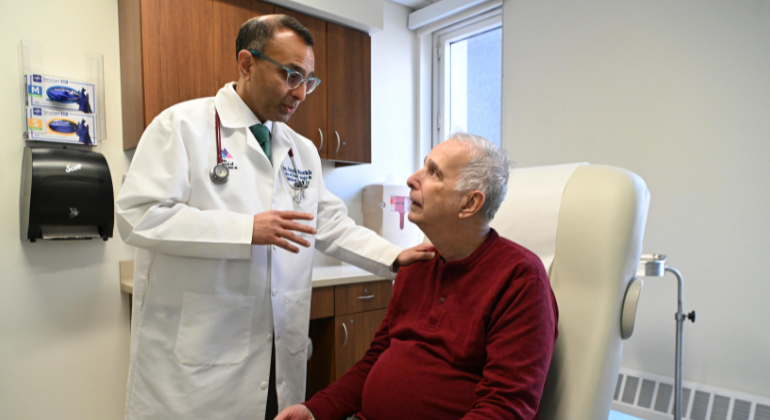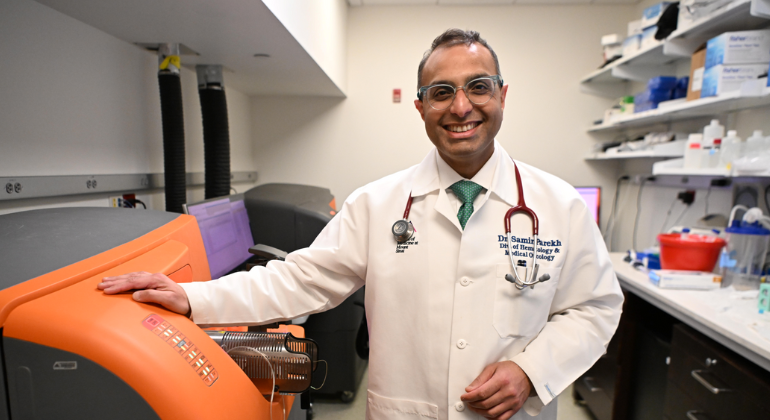Mount Sinai Researchers Develop First Mathematical Model for Predicting Patient Response to Immunotherapy
Scientists Also Helped Craft Similar Model to Predict Why Some Pancreatic Cancer Patients Survive Longer Than Others
Researchers at the Icahn School of Medicine at Mount Sinai have created the first mathematical model that can predict how a cancer patient will benefit from certain immunotherapies, according to a study published in Nature.
Scientists have long sought a way to discover whether patients will respond to new checkpoint inhibitor immunotherapies and to better understand the characteristics that indicate a tumor can be successfully treated with them. The proposed mathematical model, which captures aspects of the tumor’s evolution and the underlying interactions of the tumor with the immune system, is more accurate than previous genomic biomarkers in predicting how the tumor will respond to immunotherapy.
“We present an interdisciplinary approach to studying immunotherapy and immune surveillance of tumors,” said Benjamin Greenbaum, PhD, the senior author, who is affiliated with the departments of Medicine, Hematology and Medical Oncology, Pathology, and Oncological Sciences at The Tisch Cancer Institute at the Icahn School of Medicine at Mount Sinai. “This approach will hopefully lead to better mechanistic predictive modeling of response and future design of therapies that further take advantage of how the immune system recognizes tumors.”
This novel model also has the potential to help find new therapeutic targets within the immune system and to help design vaccines for patients who do not typically respond to immunotherapy.
To create this model, researchers used data from melanoma and lung cancer patients being treated with immune checkpoint inhibitors. The model tracked many properties within the immune response to the drugs, particularly neoantigens, which are specific to mutating and growing tumors.
Neoantigens have the potential to be prime immunotherapy targets, and the proposed framework will likely be useful in studies of acquired resistance to immunotherapy and may be crucial for understanding the circumstances in which immunotherapy causes autoimmune-like side effects.
The first author of the study is Marta Łuksza, PhD, a computer scientist from the Simons Center for Systems Biology at the Institute for Advanced Study. Dr. Greenbaum and Dr. Łuksza also played an integral role in a companion piece of research led by researchers Vinod P. Balachandran, MD, Taha Merghoub, PhD, and Steven D. Leach, MD, at Memorial Sloan Kettering Cancer Center (MSK) that was also published in Nature today. That study showed how a similar model can be used to understand immune response in patients with pancreatic cancer who survive longer than others. Both studies demonstrate that this is a likely path forward to understanding when the immune system will lead to productive recognition of a tumor.
“This research represents a big step forward in understanding why some tumors are more aggressive than others and being able to predict rationally which neoantigens will be the most effective at stimulating an immune response,” said Dr. Balachandran, a member of the David M. Rubenstein Center for Pancreatic Cancer Research at MSK, and corresponding author of the companion study in Nature.
This research was part of Stand Up To Cancer’s “Convergence” model funding, which brought together teams of scientists and clinicians from different fields and different institutions to figure out how to bring the benefits immunotherapy to more patients. It was supported by a Stand Up To Cancer–American Cancer Society Lung Cancer Dream Team Translational Research Grant (SU2C-AACR-DT17-15), a Stand Up To Cancer–National Science Foundation–Lustgarten Foundation Convergence Dream Team Grant, a Phillip A. Sharp Innovation in Collaboration Award from Stand Up To Cancer, the Janssen Research & Development LLC, the STARR Cancer Consortium, the Pershing Square Sohn Cancer Research Alliance, the NIH R01 CA205426, the V Foundation, the Lustgarten Foundation, the National Science Foundation (NSF) 1545935, the Swim Across America, Ludwig Institute for Cancer Research, the Parker Institute for Cancer Immunotherapy, the NCI K12 Paul Calabresi Career Development Award for Clinical Oncology K12CA184746-01A1. The work was also supported in part by the MSKCC Core Grant (P30 CA008748).
"It is extraordinary to see the Stand Up To Cancer 'Convergence' model, which integrates quantitative and clinical sciences, yield results like these. The potential benefit for patients diagnosed with melanoma or cancer of the lung or pancreas is exciting because these are some of the most challenging diagnoses for patients and their doctors and this research will help give patients the best information about the options they have," said Stand Up To Cancer President and CEO Sung Poblete, PhD, RN. "This research has tremendous value in predicting which patients may respond to immunotherapy before treatment begins, which will help us get the right medicine to the right patient. In addition the model provides new insights that will help researchers develop new immunotherapies for these cancers."
About the Mount Sinai Health System
Mount Sinai Health System is one of the largest academic medical systems in the New York metro area, employing 48,000 people across its hospitals and more than 400 outpatient practices, as well as more than 600 research and clinical labs, a school of nursing, and a leading school of medicine and graduate education. Mount Sinai advances health for all people, everywhere, by taking on the most complex health care challenges of our time—discovering and applying new scientific learning and knowledge; developing safer, more effective treatments; educating the next generation of medical leaders and innovators; and supporting local communities by delivering high-quality care to all who need it.
Through the integration of its hospitals, labs, and schools, Mount Sinai offers comprehensive health care solutions from birth through geriatrics, leveraging innovative approaches such as artificial intelligence and informatics while keeping patients’ medical and emotional needs at the center of all treatment. The Health System includes approximately 9,000 primary and specialty care physicians and 11 free-standing joint-venture centers throughout the five boroughs of New York City, Westchester, Long Island, and Florida. Hospitals within the System are consistently ranked by Newsweek’s® “The World’s Best Smart Hospitals, Best in State Hospitals, World Best Hospitals and Best Specialty Hospitals” and by U.S. News & World Report's® “Best Hospitals” and “Best Children’s Hospitals.” The Mount Sinai Hospital is on the U.S. News & World Report® “Best Hospitals” Honor Roll for 2024-2025.
For more information, visit https://www.mountsinai.org or find Mount Sinai on Facebook, Twitter and YouTube.

Mount Sinai Leads Phase 3 Trial in Myelofibrosis Treatment
Mar 19, 2025 View All Press Releases
Mount Sinai Highlights Key Updates and Trends for Multiple Myeloma Awareness Month 2025
Mar 03, 2025 View All Press Releases
Mount Sinai Researchers Discover Why Some Colon Cancers Resist Treatment
Feb 12, 2025 View All Press Releases
Breakthrough Treatment for Liver Cancer Shows Big Promise in Global Study
Jan 09, 2025 View All Press Releases
Mount Sinai Researchers Create AI Tool to Democratize Access to Cancer Immunotherapy
Jan 06, 2025 View All Press Releases

